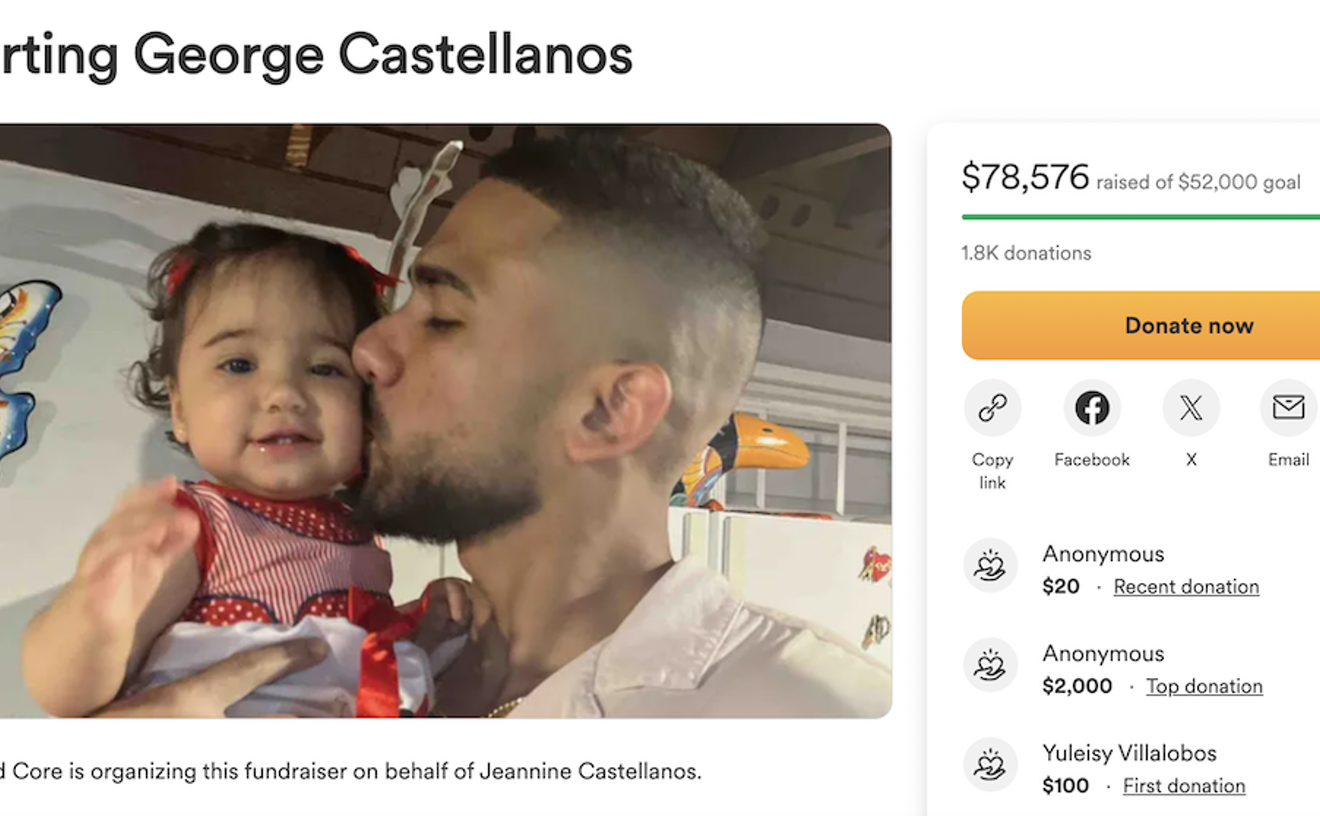Most baseball fans are familiar with Satchel Paige, the absolutely dominant Negro Leagues pitcher who played pro baseball for 40 years. In 1948, Bill Veeck, the legendary owner of the Cleveland Indians, finally gave the 41-year-old Paige a chance to pitch in the Major Leagues. It was a year after Jackie Robinson integrated baseball, but many in the Negro Leagues -- including Paige -- believed that in a just world, the old pitcher should've been given that honor.
A little-known chapter of Paige's baseball career, however, is his time in our city a decade later, playing for the minor-league Miami Marlins at the now-demolished Miami Stadium. He was hovering around 50 years old, and Miami was his last pro team before some twilight barnstorming in Havana. Consummate showman Bill Veeck was again the owner, and according to the new biography Satchel by Larry Tye, a stunt involving a helicopter on Opening Day almost killed Veeck's new pitcher. We've grabbed an excerpt from the book covering Paige's Miami years:
By 1956 Satchel was weighing retirement, which was not unreasonable for a ballplayer about to turn fifty, when Bill Veeck swept to the rescue yet again. Veeck was helping friends run the Miami Marlins, a minor league franchise in a city more interested in surfing than baseball. What better item to stir up interest, the Marlins PR impresario figured, than a pitching legend who was nearing the halfcentury mark? Veeck arranged a secretive and breathtaking first act: having Satchel climb out of a bubble-top helicopter flown onto the field on opening night. The prank almost backfired. "We lost contact with the tower and we missed our cues," recalled Marlins business manager Joe Ryan. "We were running out of fuel." Satchel had had his fill of flying years before when the Monarchs bought him a plane. "I was so scared," he said of his landing in Miami, "that pilot and me was like husband and wife until we landed."
Don Osborn, the Marlins' manager, did not object to Veeck's caper but thought it was the beginning and end of Satchel's tenure with his team. "He didn't come down here for a gag," Veeck told Osborn the next day at lunch. "He came down to pitch for us." Then
Veeck offered a test to prove Satchel's worth: "You just line up your nine best hitters, and you tell them you're going to give them tendollars for every base hit they get off him. . . . I'm paying." Satchel struck out nine men in a row and, as Veeck tells it, "Osborn fell in love with him on the spot."The Marlins parked the pitcher in a large rocking chair in the bullpen, bringing him out to throw more often than even Veeck dreamed possible. On an August night in 1956 he drew 51,713 fans to a charity game against Columbus at the Orange Bowl. Organizers
billed it "The Baseball Party to End All Baseball Parties"; record keepers called it the biggest crowd ever to watch a minor league game. Satchel pitched into the eighth inning to collect the win and drove in three runs with a 330-foot double to left-center. A week
later he pitched a one-hitter, beating Rochester 4-0 and leaving to a standing ovation. When he was not starting he stayed in the clubhouse until the late innings, then sauntered to the bullpen with towels covering his neck to keep him warm. During three seasons with the Marlins, Satchel compiled a record of 31-22 and an earned run
average of 2.73, both impressive for a pitcher of any age.He also made more friends for life. The Marlins were a blend of promising teenagers on the way up and retiring veterans looking for a soft landing. All appreciated having a relic and character like Satchel along for the ride. Anyone who happened to room near him
could hear calypso melodies spinning off the phonograph he carried everywhere. The last one to check out of the team hotel often picked up the beat-up Underwood typewriter Satchel was always forgetting. Railroad porters helped him lug his record player, typewriter, trunksize suitcase, and the extra case he carried to hold the gifts lavished on him wherever he went--but no one was allowed to touch his
medical bag loaded with lotions and potions.On one plane ride to Rochester, Satchel courageously joined in the word game Ghost, where players take turns adding letters to a growing word fragment. "Q," Satchel began. Teammate Henry "Bo" Mason challenged, doubting the aging hurler knew any words starting with that letter. "Cucumber," shot back Satchel. "Gimme my quarter." From then on club mates called him "Q." He was better at other games, yearning to pick up a stick anytime he walked by a pool hall and wanting to fish in every puddle he passed. Whenever Duke Ellington or Fats Domino was performing he took his fellow players
to the show. "He knew both of them and he introduced me," says Bo Mason, a young black pitcher whom Satch took a special interest in. "He also knew I wasn't making much money and that I liked corned beef hash and poached eggs. He'd call me up to his hotel room and order me breakfast."He did more than that for bonus baby Tom Qualters. It was early in the season near the end of a nail-biter against Buffalo when the eighteen-year-old rookie got the call to pitch. "I was totally petrified, my teeth were chattering," Qualters recalls. "You'd rather jump off a building than let your teammates know you are scared. I somehow managed to throw the ball up there and batters got themselves out, but later that night I was thinking how I could go quit. That's how bad it was. The next night I told Satchel. He laughed out loud and said, 'Those sons of bitches can beat you but they can't eat you.'
I was back in the game that night, shaking, but saying to myself, 'You sons of bitches can beat me but you can't eat me.'"It meant everything to me," adds Qualters, who has passed on the advice to countless young players he has coached. "Satchel meant that it's not a life and death situation. You do the best you can and don't let mental things interfere with the job."
While age gave Satchel perspective, it was also taking its first toll. He sliced the sides out of his shoes to let his bunions breathe and spent half of each day in the whirlpool. His flat-as-a-pancake mitt made him look even more antediluvian, and he took longer to release the baseball than anyone in the game. A pitcher who once set the clock for speed now threw a changeup so slow that his catcher could get a drink of water before the ball reached home plate. Rather than rollicking with women between games, he was playing with his kids, who along with their mother joined him in Miami for the summer.
"I almost feel like as big a celebrity as you," Lahoma told Satchel. "I wish it could be this way always."His honeymoon with the Marlins ended the same way it had with the Indians and Browns. Veeck left. Satchel's pitching stayed strong, but not as strong. Disagreements flared over everything from meal money to salary. In August of 1958 Satchel was suspended for what the team said was his "utter disregard of rules"; he asked for but was denied his unconditional release. He finished out the season but after that both sides called it quits.
Excerpted from SATCHEL: The Life and Times of an American Legend by Larry Tye. Copyright © 2009 by Larry Tye. Excerpted by permission of Random House, a division of Random House, Inc. All rights reserved.










